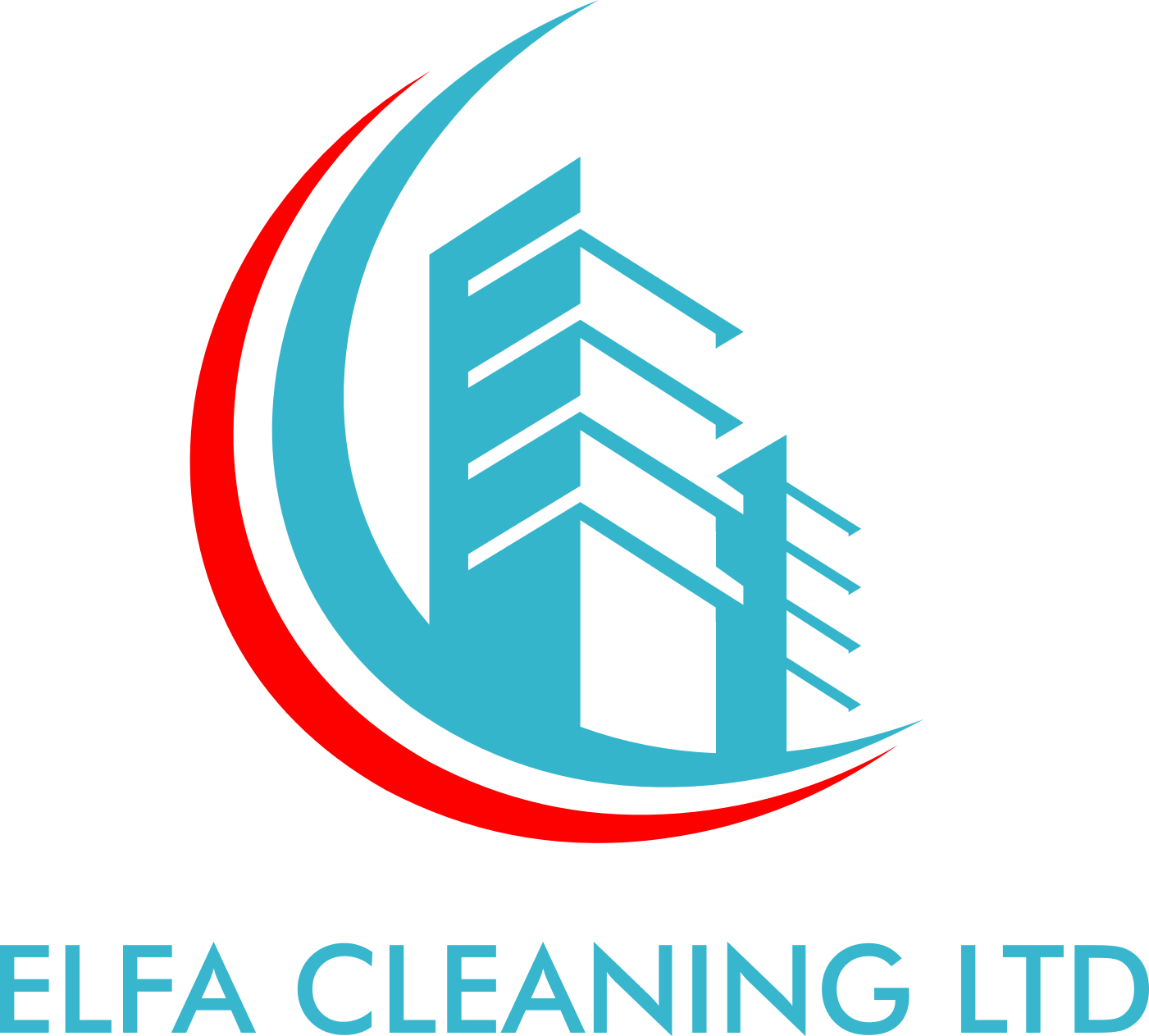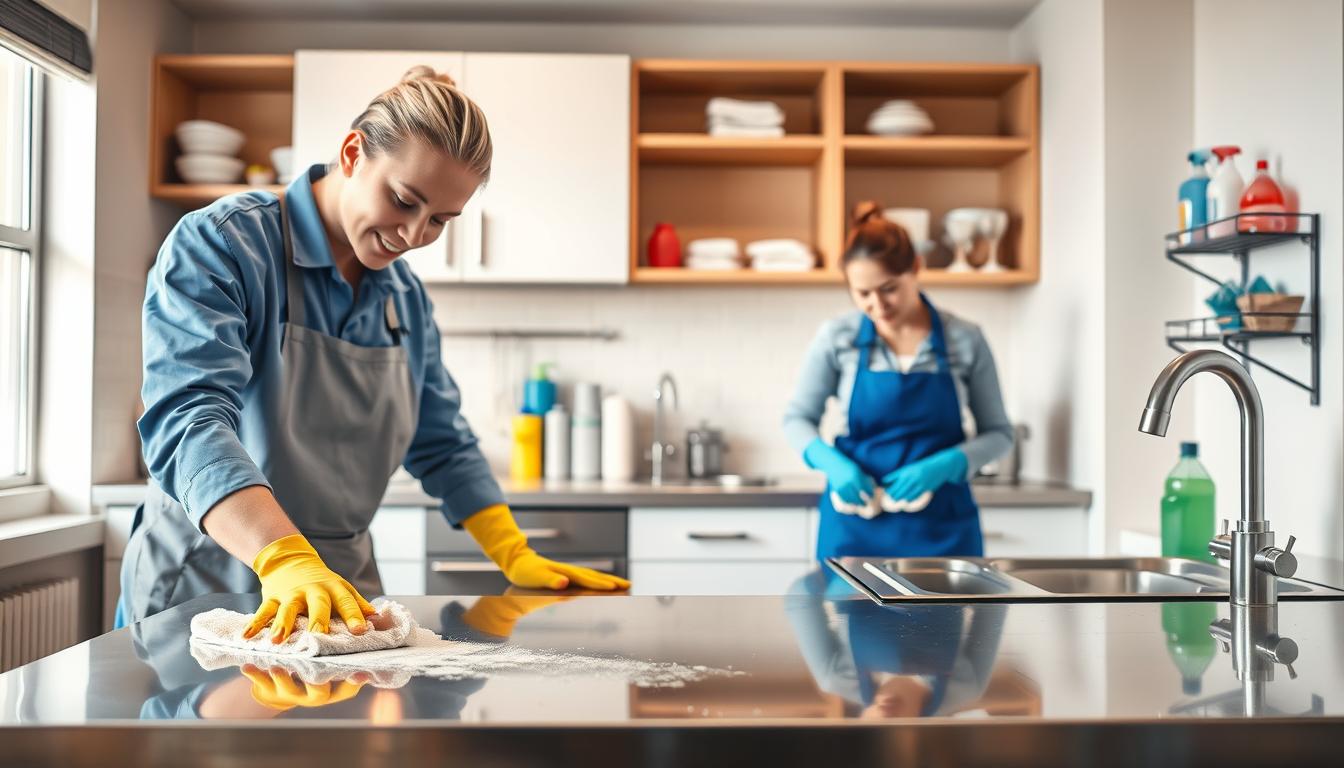ELFA Cleaning LTD offers a practical, friendly guide for UK homeowners who want spotless kitchen worktops without fuss. This short intro explains simple daily steps and when to call professionals for deeper care.
Worktops gather crumbs and splatters every day. A quick wipe with diluted washing-up liquid, a rinse, then buffing with a microfibre cloth gives an instant, streak-free finish.
Different materials need different methods. Natural stone must not meet vinegar, stainless steel takes gentle rinsing and drying along the grain, and timber benefits from regular oiling to avoid damage.
Decluttering speeds tasks and reduces build-up. For tougher marks, use pH-neutral or specialist products; DIY pastes like baking soda help without risking harm.
Expect hygienic results today and longer-term protection with simple maintenance. ELFA Cleaning LTD can help with deep cleans, resealing and restoration when needed.
Key Takeaways
- Use warm water with washing-up liquid, rinse well and buff dry for daily care.
- Match method to material to avoid staining or scratching valuable worktops.
- Avoid vinegar on natural stone and abrasive pads on metal or laminate.
- Declutter counters to reduce grime traps and speed cleaning.
- Call ELFA Cleaning LTD for resealing, oiling or deep restoration beyond routine maintenance.
Why a consistent routine matters for spotless kitchen worktops
A two-minute habit after cooking saves time and protects your kitchen surfaces. A short daily wipe with a soft sponge or microfibre cloth prevents grease and crumbs from setting. Do this near sinks, seams and edges where moisture hangs around.
Immediate action stops stains. Wipe spills straight away to avoid watermarks and sticky patches. Use chopping boards and heat mats to reduce scratches and heat damage that lead to costly repairs.
Keep a small caddy ready: a soft sponge, a microfibre cloth, a mild soap solution and a dry cloth for buffing. This kit makes weekly and seasonal maintenance far quicker.
- Two to three minutes daily prevents dried-on grime later.
- Declutter around kettles, toasters and utensil pots to lower bacteria traps.
- Do a weekly check for chips or scratches so you can touch up early.
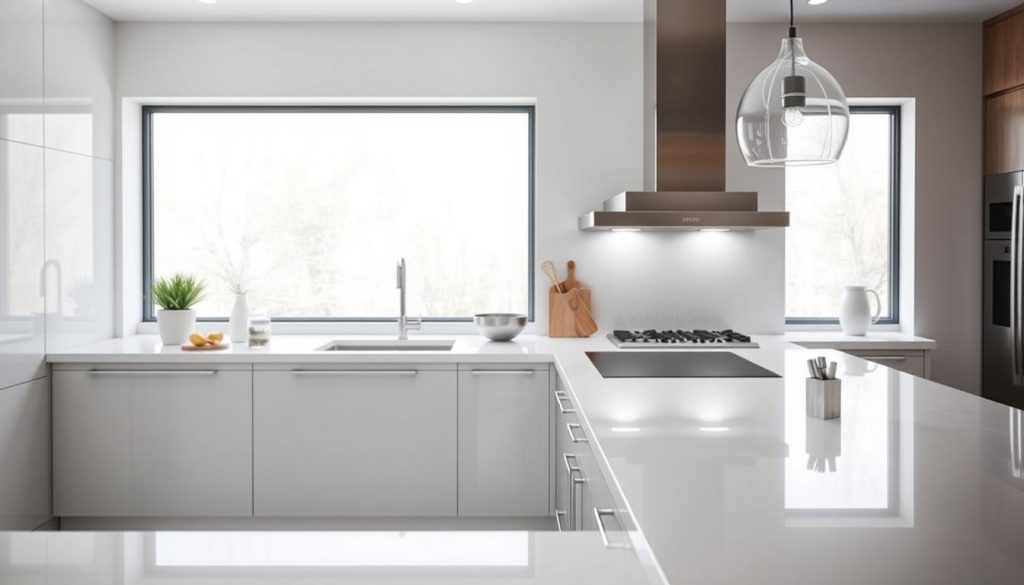
ELFA Cleaning LTD offers periodic deep cleans and tailored products to reset the finish and protect seals and edgebanding. Consistent care preserves the original sheen of your kitchen worktops and reduces the need for major restoration.
Daily clean: simple steps to clean and wash all tops and work surfaces
Spend five minutes each day using gentle tools and you’ll avoid bigger chores later. ELFA Cleaning LTD champions small routines that protect finishes and keep your kitchen ready for use.
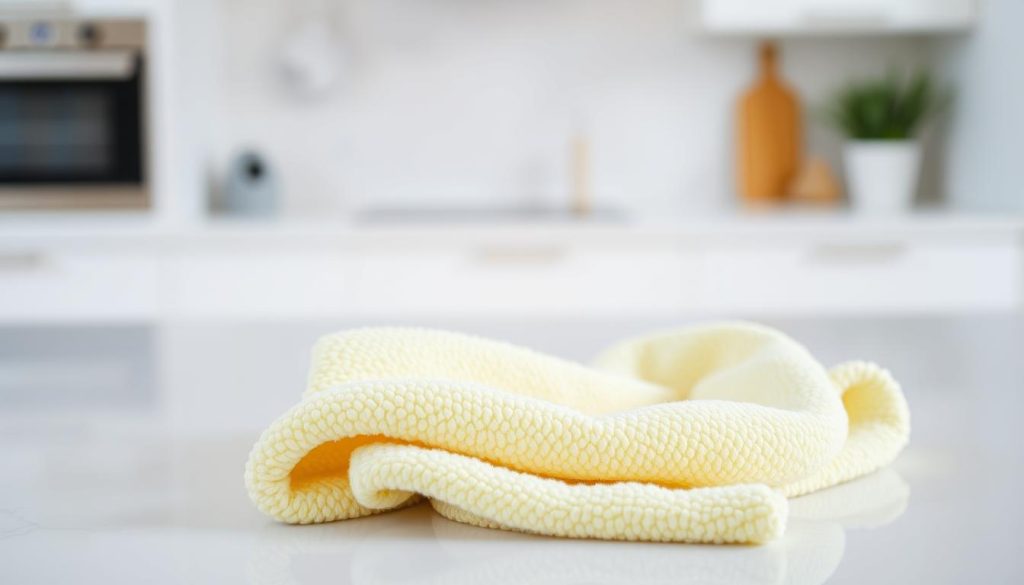
Essential kit
Assemble a caddy with microfibre cloths, a soft sponge, a spray bottle of mild soap solution and a dry cloth for a streak-free shine.
Quick wipe-down routine
Use washing-up liquid with hot water to wash, then rinse the cloth in warm water and wring well. Rinse the area, then buff with a microfibre cloth to a dry, streak-free finish.
Declutter to speed tasks
Minimise gadgets and tidy cables so crumbs do not hide. Work from the cleanest zone to the messiest, finishing at the hob and sink to avoid spreading grease.
- Follow the grain on stainless steel with a soft cloth; finish with a dry microfibre buff.
- For textured laminate use a gentle nylon brush to lift crumbs, then wipe and thoroughly dry joins.
- Adopt the two-cloth method: one damp for washing, one dry for the final polish.
| Item | Use | Tip |
|---|---|---|
| Microfibre cloth | Buff to shine | Change daily for hygiene |
| Soft sponge | Apply mild suds | Avoid abrasive sides on delicate finishes |
| Nylon brush | Textured laminate grain | Rinse after any solvent use |
How to clean different worktop materials the right way
Each worktop material needs its own straightforward routine to stay looking its best. Below are simple, practical methods ELFA Cleaning LTD recommends for common kitchen worktops in UK homes.
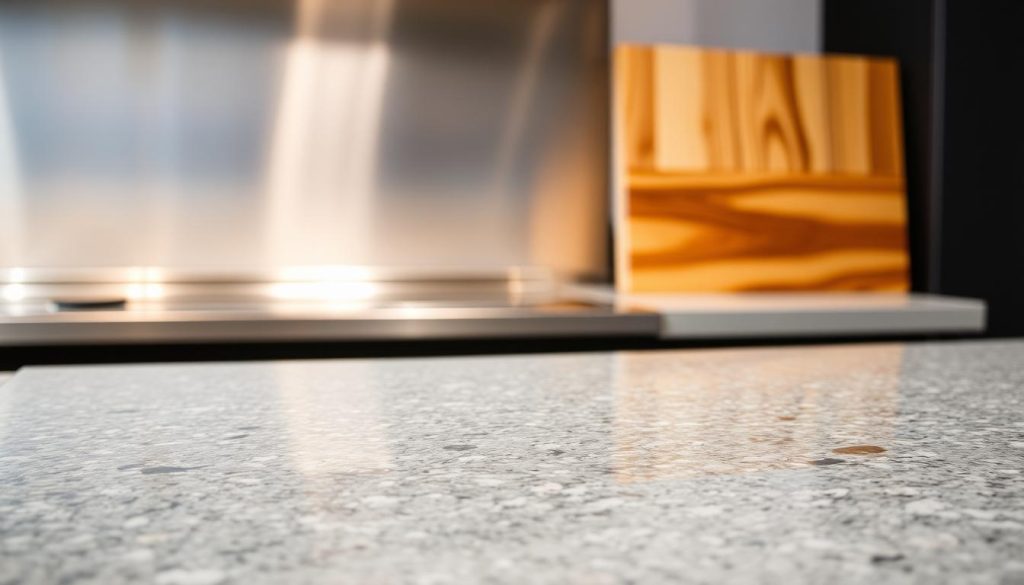
Wood and butcher block
Use warm water with a little soap on a soft cloth, wipe dry straight away to protect joins, then oil quarterly or per maker guidance to resist moisture and stains.
Natural stone (granite, marble, limestone)
Stick to pH-neutral cleaners or mild washing-up liquid. Never use vinegar or bleach. Mop spills quickly and reseal when manufacturer guidance allows to protect the stone.
Quartz composite, laminate and composites
For quartz, use a mild detergent with warm water; treat stubborn marks with a baking soda paste for a few minutes, then rinse and dry. For laminate, avoid abrasive cleaners and use solvents only for ink or polish—rinse thoroughly and repair chips with a laminate repairer.
Stainless steel, glass and solid surfaces
Wipe stainless steel along the grain with washing-up liquid and a soft cloth, then buff dry; a little baby oil reduces fingerprints. For glass worktops, soapy water followed by a glass cleaner keeps a smear-free shine. Corian and concrete like pH‑balanced products; avoid harsh chemicals, direct heat and use trivets to prevent damage.
- Always check the maker’s guidance for compatible cleaners, sealing or oiling intervals.
- Focus drying on cut-outs, tap bases and seams to stop swelling or staining.
- Patch-test a new cleaner on an inconspicuous area before wider use.
Tackling grease, stains and stubborn marks without damage
Tackling stubborn marks starts with a careful, step-by-step approach that protects finishes. Begin with the mildest solution: warm water with a little soap and a soft cloth. Work gently and only escalate if the mark stays.
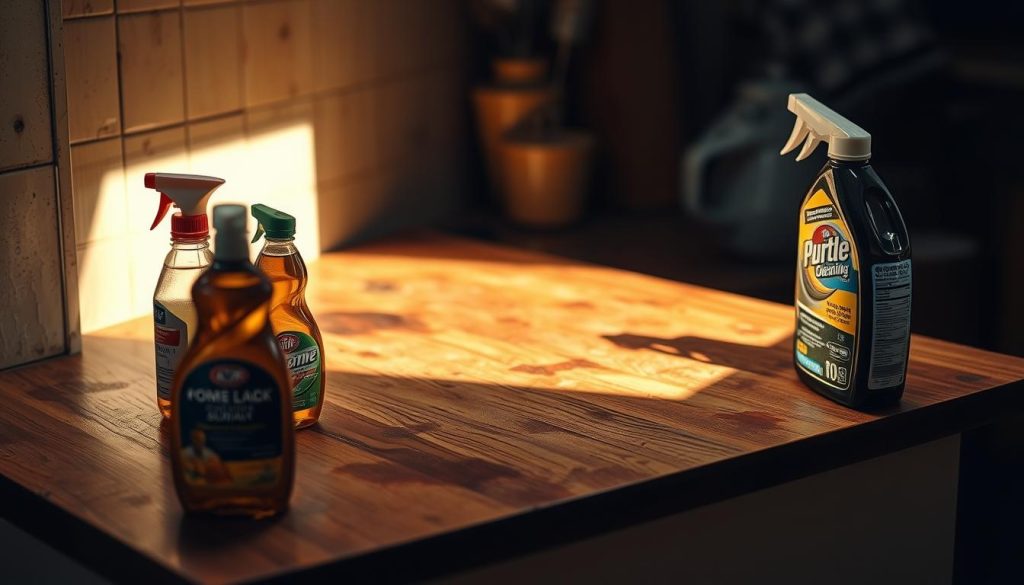
Baking soda paste for organic marks
For tea, coffee or food splatters, make a paste from baking soda and water. Apply briefly, agitate with a soft cloth, then rinse and dry fully to avoid residue.
When to use specialist cleaners
Natural stone needs pH-neutral stone cleaner for deep stains; never use acids or bleach that etch the finish. For stainless steel, use a mild detergent, dry along the grain, then buff with a drop of baby oil to remove smears.
- Try the least harsh option first to protect the surface.
- Use white spirit sparingly on laminate for ink or polish, then rinse thoroughly.
- For textured laminate, work with a nylon brush into grooves without scrubbing hard.
- Choose pH-balanced products for concrete; avoid bleach which can discolour porous areas.
- If marks resist, book ELFA Cleaning LTD for pro-grade cleaners and safe restoration of your worktops.
Disinfecting safely: what to use and where to avoid it
When microbes are a concern, follow safe disinfecting steps that respect material limits. Disinfection is more intensive than routine care and should follow a visible wipe so dirt no longer hides germs.
Food-safe options
For non-porous worktops, a DIY bleach solution works well. Mix about half a cup of bleach per gallon of water, apply, leave 5–10 minutes, then rinse dry. Wear gloves and ventilate the room.
Hydrogen peroxide diluted in water is a good alternative. It breaks down to water and oxygen and leaves less residue. Allow contact time, then rinse and buff dry to avoid marks.
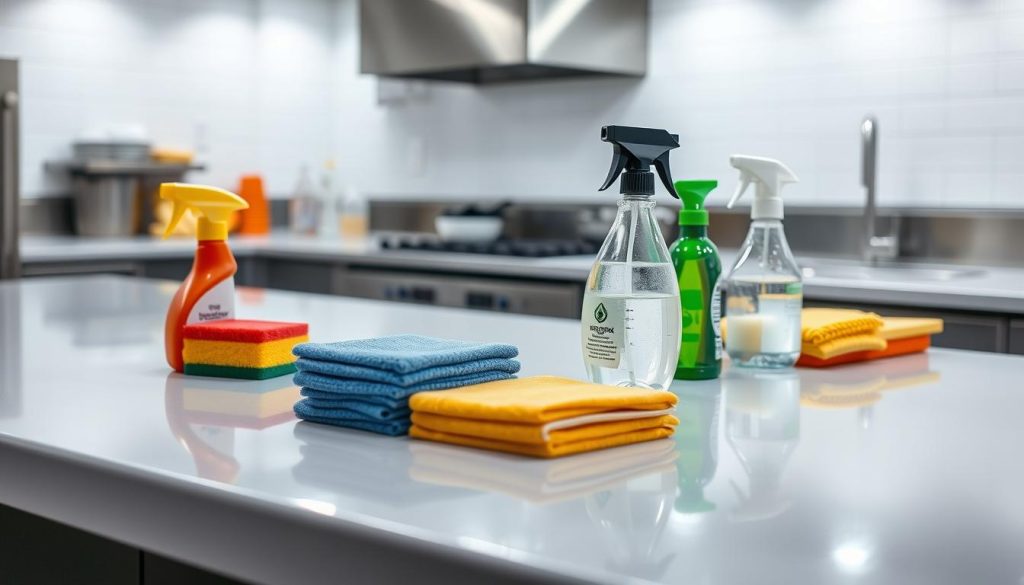
- Keep vinegar away from natural stone; acids etch and dull the finish. Use a pH‑neutral cleaner for stone.
- Do not use limescale removers on enamel; remove scale with a plastic scourer and neat washing-up liquid, then rinse and dry.
- Never mix bleach with other products. Always test a small hidden patch on sensitive materials first.
- Focus disinfection on high-risk kitchen zones—sinks, chopping areas and handles—rather than treating every surface unnecessarily.
| Step | Recommended option | Why |
|---|---|---|
| Heavy-duty disinfection | Bleach solution | Kills a wide range of microbes; needs contact time then thorough rinse |
| Safer alternative | Hydrogen peroxide solution | Breaks down cleanly; good for sensitive finishes |
| Delicate material care | pH-neutral products | Protects natural stone and specialist worktops |
If you are unsure which products suit your worktops, consult ELFA Cleaning LTD for material-safe protocols and professional products tailored to UK homes.
Protection and care: prevent scratches, stains and heat damage
A little prevention goes a long way to avoid marks and heat damage. Simple daily habits protect valuable worktops and cut the need for repairs. Keep tools and hot pans off finishes to reduce risk.
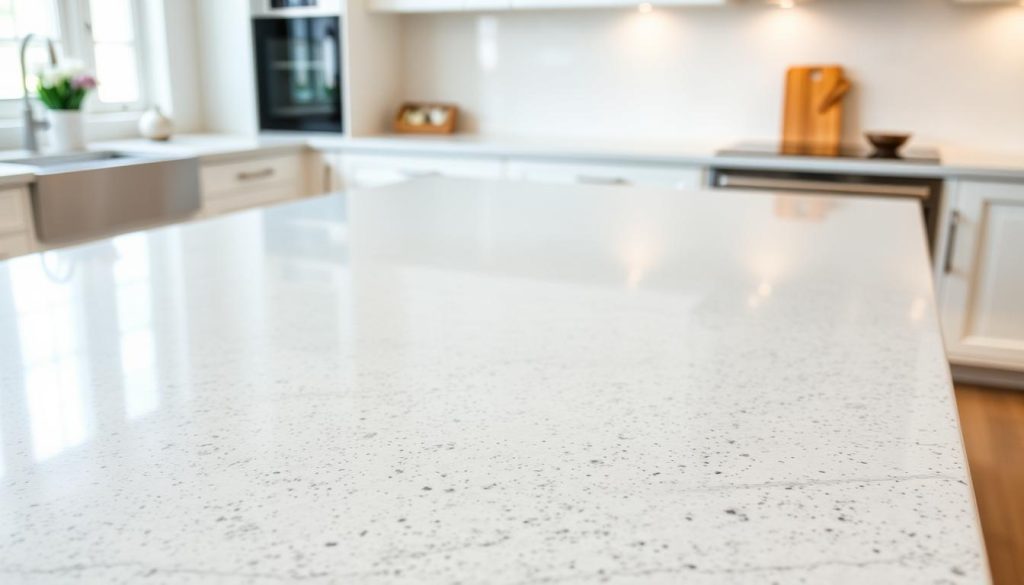
Use chopping boards and trivets to defend finishes
Always use chopping boards to stop knife marks and preserve edges. Teach household members to use boards rather than cutting directly on the surface.
Place trivets or heat mats under hot pans and air fryers to prevent scorch marks. Lift heavy pots instead of dragging to avoid micro-scratches and wear.
Sealants, oiling and scheduled maintenance
Dry surfaces after use, especially timber and compact laminate, to prevent swelling or staining. Reseal natural stone when recommended and oil wooden tops every few months.
“Prevention-first habits extend life and keep finishes looking new.”
- Fit silicone feet to appliances to stop dragging and scratches.
- Repair small chips with a colour-matched patch; pro re-polishing can restore many solid finishes.
- Book ELFA Cleaning LTD for periodic maintenance to top up sealants, apply oils and prevent lasting damage.
Common mistakes to avoid when cleaning kitchen worktops
Everyday shortcuts quietly create permanent dulling and damage to valuable kitchen finishes. Simple errors often lead to stains, etching or swollen edges that need repair.
Abrasive cleaning pads and powders scratch gloss on laminate, stainless steel and glass. Use non-scratch tools and avoid abrasive cleaners to protect finishes.
Do not leave spills to sit. Pigments and acids sink into marble and limestone quickly. Wipe, rinse and buff dry to stop lasting marks.
Over-wetting timber or compact laminate invites swelling at joins and edges. Work with a well-wrung cloth and dry thoroughly.
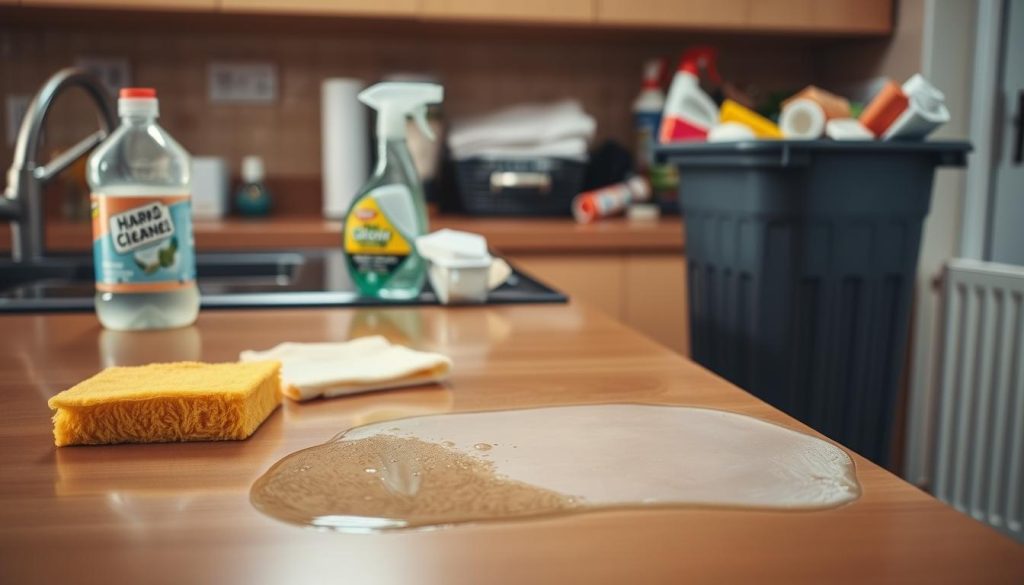
“Treat small nicks early — sealing stops moisture entry and bigger repairs.”
| Mistake | Risk | Quick fix |
|---|---|---|
| Using abrasive pads | Fine scratches; dull finish | Switch to microfibre or soft nylon pads |
| Leaving spills | Stains, etching on marble | Wipe immediately; rinse and dry |
| Over-spraying products | Residue build-up; streaks | Use minimal product; rinse after heavy cleaners |
| Dragging appliances | Scuffs and edge damage | Fit silicone feet and lift when moving |
- Use chopping boards and heat mats to prevent blade marks and scorch.
- If unsure which product suits a surface, ask ELFA Cleaning LTD for safe recommendations to avoid accidental damage.
How ELFA Cleaning LTD can help you clean and wash all tops and work surfaces
Bring in professional care to restore sheen on tired kitchen worktops without hefty disruption.
ELFA Cleaning LTD uses tested products and pro equipment to treat each material correctly. We select proprietary stone cleaners for granite, marble and limestone, and pH‑balanced solutions for concrete. For quartz, stainless steel and solid surface pieces we use ammonia-safe approaches and follow the grain with soft cloths.
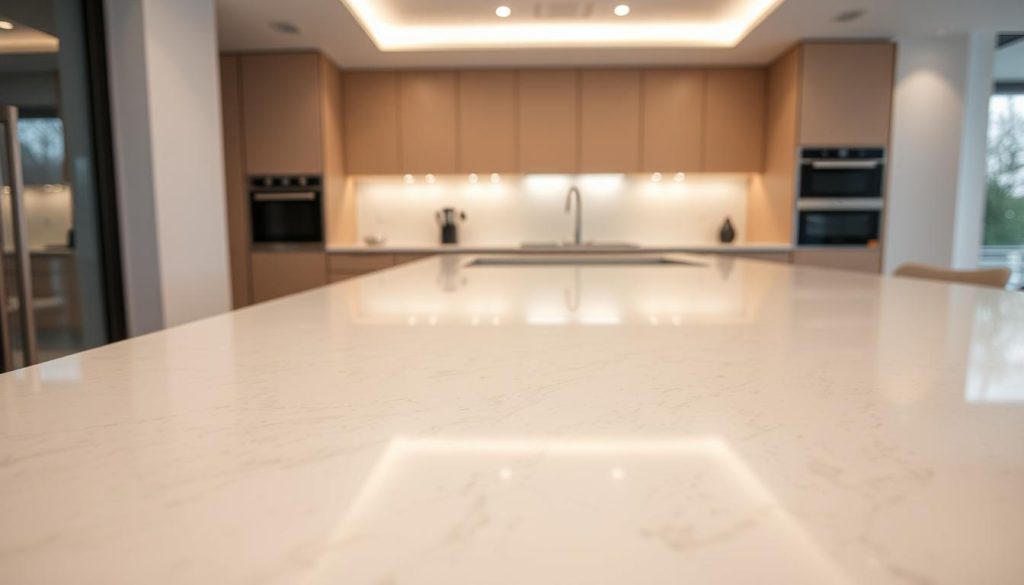
Professional-grade products, tailored methods
Expect UK-standard processes: apply a compatible cleaner, rinse thoroughly, then dry and buff for a streak-free finish. We avoid acids on natural stone and never use abrasive pads on stainless steel or laminate.
One-off deep cleans and regular maintenance
Choose a one-off deep clean to remove build-up and refresh sheen. Or pick a maintenance plan that includes oiling for wood, resealing approved stone and periodic re-polishing of solid surface pieces.
| Service | What we use | Benefit |
|---|---|---|
| Stone restoration | Proprietary stone cleaner; sealers like Granite Gold | Protects against stains; restores finish |
| Stainless steel care | Soft cloths; grain-following technique | Removes smears; avoids micro-scratches |
| Wood maintenance | Specialist oils per maker guidance | Prevents swelling; renews tone |
| Quartz & laminate | pH-balanced cleaner; gentle abrasives if needed | Safe stain removal; minimal risk of etching |
- Tailored care for each material keeps kitchen worktops looking their best.
- Aftercare advice helps you keep daily routines quick and effective.
- Request a free assessment to build a plan that suits your household.
Conclusion
A short, regular routine keeps kitchen finishes looking their best without fuss.
This guide sums up simple steps: gentle daily wiping with a mild detergent and a microfibre cloth, prompt spill response, then a full rinse and dry. Match products to each material for long-term protection and sensible maintenance.
Use chopping boards to stop knife marks and trivets for hot pans. For natural stone, choose pH‑neutral solutions only. Oil timber on a seasonal rhythm and use pH‑balanced care for concrete. Avoid abrasive pads and acids that dull or etch.
Many minor marks can be fixed early, while stubborn damage benefits from professional help. Contact ELFA Cleaning LTD for a bespoke plan—one-off deep cleans, resealing or ongoing support—so your kitchen worktops stay durable, hygienic and ready for daily life.
FAQ
What daily routine keeps kitchen worktops looking their best?
Wipe surfaces with a microfibre cloth and warm soapy water, rinse and dry immediately. Remove clutter so you can reach every area. Buff with a soft cloth for a streak-free finish and treat spills quickly to avoid stains or damage.
Which kit should I keep handy for everyday surface care?
Keep microfibre cloths, a soft sponge, a mild detergent or washing-up liquid, a spray bottle of warm water and a soft, dry cloth. For food prep, use chopping boards to protect materials from cuts and heat.
How do I care for wooden and butcher block worktops?
Wipe with warm soapy water and dry straight away. Regularly oil the wood using a food-safe oil to maintain the finish and prevent drying or cracking. Avoid soaking and never use harsh abrasives.
What should I avoid on natural stone like granite or marble?
Never use vinegar, bleach or acidic cleaners on stone. Use a pH-neutral stone cleaner or a mild detergent, rinse well and dry. Avoid abrasive pads that cause scratches and always use coasters and trivets.
How can I remove stubborn marks from quartz composite worktops?
Use a mild detergent and warm water first. For stubborn stains, apply a baking soda paste, let it sit briefly and gently rub with a soft cloth. Rinse and dry. Avoid heat directly on the surface and strong solvents.
Which cleaners suit laminate and composite surfaces?
A solution of washing-up liquid and warm water works well. Avoid abrasive cleaners and scouring pads that cause scratches. Repair chips promptly with suitable filler products to prevent further damage.
How do I maintain stainless steel worktops without scratching them?
Use a soft cloth with warm soapy water and follow the grain when wiping. Rinse and dry to prevent watermarks. Use specialist stainless steel polishes sparingly and avoid abrasive cleaners and steel wool.
What is the best method for glass worktops?
Wash with soapy water, rinse, then use a good glass cleaner to prevent smears. Dry with a lint-free cloth and avoid heavy impacts that could chip the edge.
How should I treat concrete and solid surfaces like Corian?
Use pH-balanced cleaners and avoid harsh chemicals and excessive heat. For light scratches, a fine abrasive pad with a manufacturer-recommended product can help; for deeper damage contact a specialist.
What household remedies work for grease without harming finishes?
Apply a small amount of washing-up liquid and warm water to lift grease, then rinse and dry. For tougher grease, a baking soda paste can help; test in a discreet spot first to ensure no damage.
When are specialist cleaners necessary for stone or metal?
Use specialist stone cleaners for deep stains on marble or limestone and dedicated stainless steel products for persistent marks. If in doubt, consult the worktop manufacturer or a professional to avoid irreversible harm.
Is it safe to disinfect kitchen surfaces with bleach or hydrogen peroxide?
Diluted bleach or hydrogen peroxide can be used on many surfaces for food-safe disinfection, but rinse thoroughly afterwards. Avoid acids and limescale removers on natural stone and always follow product instructions.
How can I protect worktops from scratches, stains and heat damage?
Always use chopping boards and trivets. Seal stone and oil wooden worktops as recommended. Avoid placing hot pans directly on the surface and be cautious with sharp utensils.
What common cleaning mistakes should I avoid?
Don’t leave spills to sit, avoid abrasive cleaners and over-wetting sensitive materials. Never use acidic products on stone or apply heat directly to heat-sensitive finishes.
How can ELFA Cleaning LTD help maintain my kitchen surfaces?
ELFA Cleaning LTD offers professional-grade products and tailored care for each worktop material. They provide one-off deep cleans and regular maintenance plans to keep surfaces pristine to UK standards.
